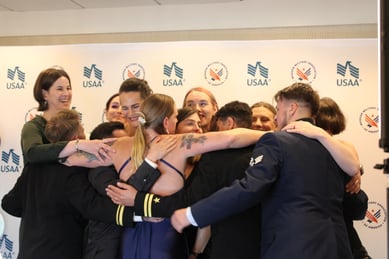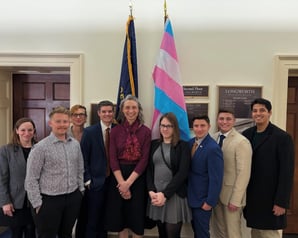.jpg?width=399&height=299&name=IMG_4068%20(1).jpg) In June, PG's Pride Alliance ERG hosted an event with the Modern Military Association of America (shown here attending World Pride in Washington D.C.) aimed at giving our employees a better understanding of the critical issues and areas of support that live at the intersection of the LGBTQ+ and veteran communities. Modern Military has been around for more than 30 years providing resources to LGBTQ+ service members, veterans, and their families as well as people living with HIV. Their work is more important now than ever as the LGBTQ+ community continues to navigate legal battles and encroachments on civil liberties, including the right to serve in the military.
In June, PG's Pride Alliance ERG hosted an event with the Modern Military Association of America (shown here attending World Pride in Washington D.C.) aimed at giving our employees a better understanding of the critical issues and areas of support that live at the intersection of the LGBTQ+ and veteran communities. Modern Military has been around for more than 30 years providing resources to LGBTQ+ service members, veterans, and their families as well as people living with HIV. Their work is more important now than ever as the LGBTQ+ community continues to navigate legal battles and encroachments on civil liberties, including the right to serve in the military.With the anticipated release of thousands of transgender troops and the need for them to quickly assimilate into civilian life, we asked Modern Military to share their expertise in creating a company culture that embraces veterans, and they delivered information that could benefit any organization. Check out their responses to our Q&A below!
What are some challenges facing veterans entering the civilian workforce?
Every military service member will face some challenges when transitioning to the civilian workforce, regardless of their sexual orientation or gender identity.
It's easy to assume that the biggest challenges for service members entering the civilian workforce are technical, like how to write a resume, what to wear to an interview, or how to resist the urge to call everyone “sir” or “ma’am.” But the real challenge runs much deeper than that.

Veterans are leaving a total institution—one that has dictated not just their career path, but their schedule, their attire, their values, and their identity. For many, this is the first time they’ve been asked, “what do you want?” And the truth is, they often don’t know because until now, they haven't had to ask.
Suddenly, every option is on the table. Where to live. What to do. What matters most. And instead of feeling free, it can feel overwhelming or even paralyzing. Without clear direction and ample time to prepare, many default to the “easy button,” picking a paycheck or a city without examining whether it actually aligns with who they are or what they want for the next phase of life.
The biggest challenge isn’t just translating skills onto a resume. It’s navigating the loss of purpose, identity, and a built-in support network, all while trying to rediscover who they are and what comes next. For the LGBTQ+ military community, these challenges are exacerbated by considerations like state and local laws, community culture surrounding LGBTQ+ issues, and whether corporations adhere to anti-discrimination hiring and employment practices.
How can businesses prepare themselves culturally to receive veterans as employees?
It’s one thing to be military friendly by saying that you support veterans on your website or making a social media post on Veterans Day. But it’s another thing entirely to be military ready. Being military ready means your organization has taken the time to understand where veterans are coming from and what they may need as they transition into a completely new culture. Here are some actionable steps that your organization can take to be military ready:
- Review job descriptions for jargon and “must-have” language. Many veterans won't apply unless they meet 100% of the listed criteria. Clarify which skills are truly essential and which can be learned.
- Offer informational interviews outside of the formal hiring process: These conversations help veterans understand things they may not be familiar with, like your culture, org structure, and role qualifications or expectations.
- Pair new veteran hires with a mentor or peer “buddy.” Ideally, this person can serve as a sounding board in the first few months and be a safe space for your employee to ask seemingly obvious questions.
When supporting LGBTQ+ veterans, it's also vital to have cultural competency in the issues that impact the entire LGBTQ+ community.
What are a few ways that employers and colleagues can support veterans in their mental health?
The first step is knowing how to help anyone, civilian or veteran, in a mental health crisis. Be willing to ask the awkward question: are you okay? Do you need help? Sometimes that question can act as a lifeline to someone who is struggling.
If you, a coworker, or someone else is currently experiencing an acute mental health emergency, please dial 911 or go to your nearest emergency room.
For confidential support 24/7, you can contact the National Suicide and Crisis Lifeline by:
- Dialing 988 and press 1 for Veterans
- Texting 838255
- Live chatting at veterancrisisline.net
Find additional LGBTQ+ support hotlines curated courtesy of PFLAG on their website.
 Modern Military has peer-to-peer programs specifically designed for LGBTQ+ military service members, veterans, and their families. These programs help create a sense of belonging and community, offering resources that can assist LGBTQ+ veterans in navigating their unique challenges. Research has shown that interpersonal connections can drastically reduce symptoms of depression and anxiety and decrease suicidality.
Modern Military has peer-to-peer programs specifically designed for LGBTQ+ military service members, veterans, and their families. These programs help create a sense of belonging and community, offering resources that can assist LGBTQ+ veterans in navigating their unique challenges. Research has shown that interpersonal connections can drastically reduce symptoms of depression and anxiety and decrease suicidality. We want to issue a hearty thank you to our friends at Modern Military for their continued work supporting LBTQ+ veterans and their families, and for taking the time to educate folks on how they can be better allies to both of these communities. Visit modernmilitary.org and click “find resources” for more information about their programs, or click “donate“ to support their work.


 Populus Group
Populus Group
Leave a comment